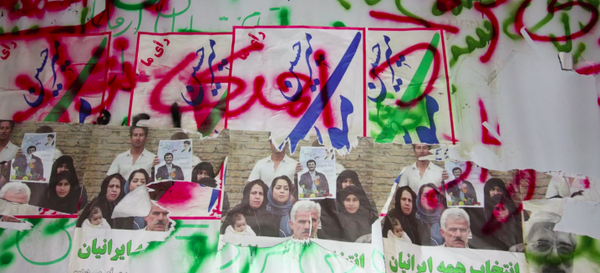“We read the walls and find out what dreams the people of the city have. Who are their rulers? What are the real thoughts of those who are thinking of changing the status quo? How do the dissidents come out in secret and write on the walls — walls that face the future and turn their backs on the past?”
These words come from the documentary Writing on the City by Keywan Karimi. When he was writing these sentences, it was not likely that he could have imagined what would happen, that one day he would be arrested and tried for them. On November 23, that is exactly what happened: the 31-year-old filmmaker was sent to Evin Prison to serve a prison sentence in connection with the film. He was arrested at his home in the winter of 2013, a few days after a preview of the documentary was posted on YouTube. He spent 12 days in solitary confinement and was released on bail.
Writing on the City tells the story of graffiti on Tehran walls, from the days of the 1979 Islamic Revolution and “Hail Khomeini!” to the Green Movement, the aftermath of the disputed 2009 presidential election and “Death to the Dictator!” It portrays changes in the city’s graffiti brought about by political and social events throughout this period.
“The walls are reminders of the Constitutional and 1979 revolutions, the passion for freedom and the rage hidden in prison, from Evin to Qasr,” the documentary declares. “There are no walls in the city without a trace of markers and spray paints — even if they are white as white can be. The walls and the graffiti never let go of each other. This eternal pact is what Writing on the City is about.”

A Flogging for Shaking Hands
The documentary was produced by the Tehran University. The university and the filmmaker secured all the required permits, but it was never finished. On October 13, 2015, the Revolutionary Court under Judge Mohammad Moghiseh —whom human rights organizations and the European Union accuse of violating the rights of the defendants — sentenced Karimi to six years in prison for “propaganda against the regime” and “insulting the sacred.” The court also sentenced him to 223 lashes for “illicit relations” because he had shook hands with a woman who was not related to him. The appeals court reduced Karimi’s sentence to one year in prison but upheld the flogging. Then, on November 23 this year, he received a phone call. He was told to go to Evin’s prosecution office “to explain certain things.” When he arrived, he faced immediate arrest and was taken to Evin Prison.
Writing on the City remains unfinished, and even its preview has not been screened in Iran — Iranians can only see the preview on YouTube. “My client was charged with insult and propaganda against the regime for making a documentary,” his lawyer Amir Raeesian told IranWire. “This documentary that has not been shown anywhere and has not been seen by anybody has been used as grounds to charge and convict Karimi. This is the wrong association...because my client has done nothing without a permit and nothing in violation of the law.”
The preview of the documentary was later shown outside Iran at several international film festivals.It was praised by critics. It won the prize at Montpellier Film Festival in France and was last screened in October at the Vienna International Film Festival.
Deaf Ears to International Appeals
Keywan Karimi’s ordeal led to protests and appeals for clemency from many European filmmakers. In 2015, 45 members of the European Parliament signed a statement asking Iran to lift “all legal constraints and restrictions against Keywan Karimi to ensure his full freedom of movement and freedom of expression in accordance with international law and international conventions ratified by your country.” The appeal was echoed by Amnesty International, which this year launched a campaign for his release. Apparently, however, all appeals have fallen on deaf ears.
Keywan Karimi is a graduate of communication studies from the Faculty of Social Sciences at the University of Tehran. He started his artistic endeavors when he was a teenager and has so far made 12 documentaries and feature films, in addition to several photography projects. He originally comes from Iranian Kurdistan, and some of his documentaries focus on the difficult lives of the Kurds who live in the Iranian-Iraqi border areas. One documentary, Broken Border, won the prize for the best documentary short at Beirut International Film Festival in 2013. The film casts a poetic look at fuel smuggling and the animals and nature around the smugglers’ route.
His short The Adventure of a Married Couple has been shown at more than 40 film festivals, including at San Sebastian, Zurich, and Fribourg International Film Festivals, and has won several prizes. Based on a story by Italo Calvino about a hard-working, exploited couple, the film is about 11 minutes long and has no dialogue.
Even while he was waiting for the court’s verdict, Karimi continued his work. He finished Drum, his first feature-length film, in the spring of 2016 and it was premiered at Film Critics Week at the Venice International Film Festival. It tells the story of a lawyer whose life turns upside down when he receives a package. The atmosphere is dreamlike, the movie is shot in black-and-white and neither the streets nor the characters have names.
The quality of Keywan Karimi’s imagery is so powerful that one wishes he had been able to take his camera with him when he was sent to prison.
visit the accountability section
In this section of Iran Wire, you can contact the officials and launch your campaign for various problems

























comments